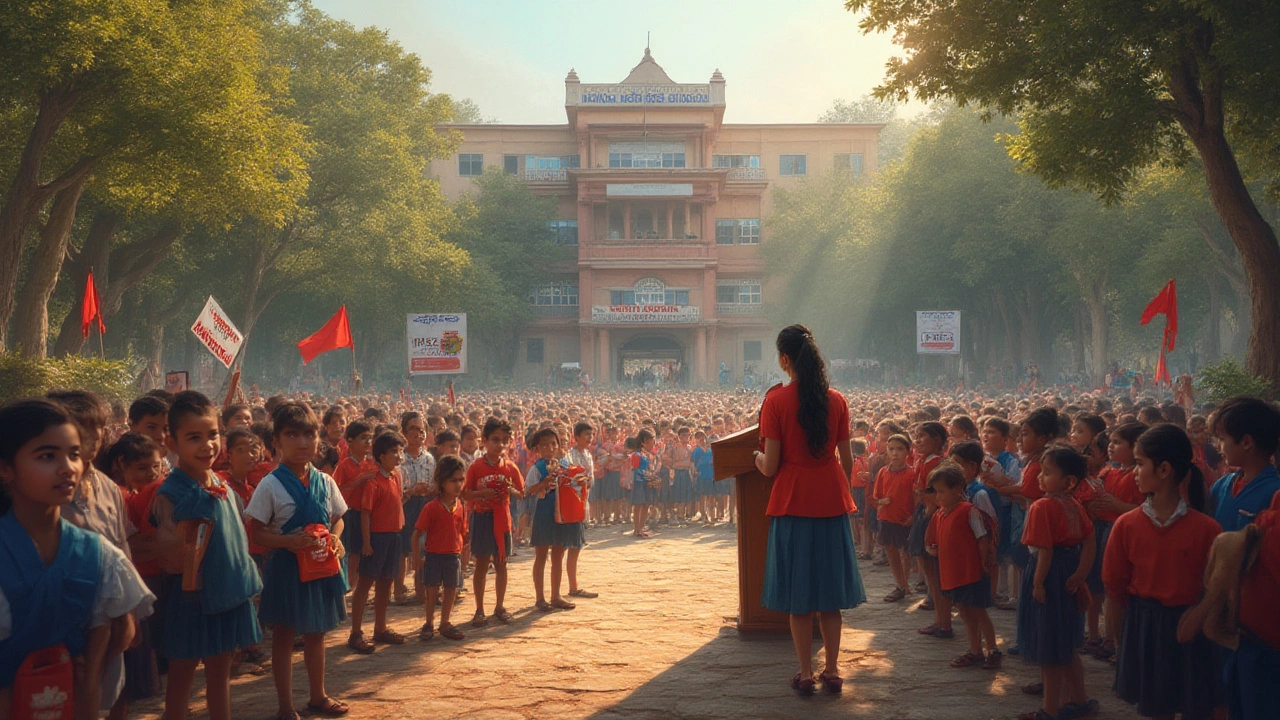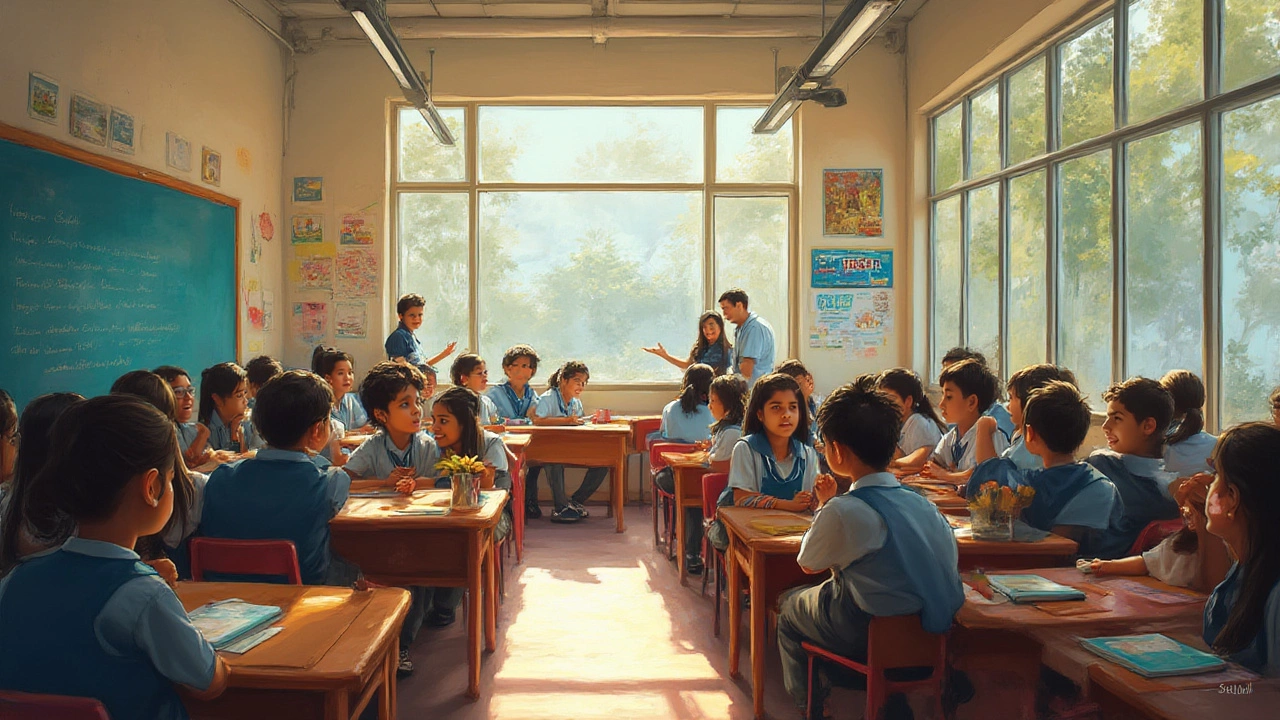Parents often get thrown into a whirlwind of doubt: is Delhi Public School (DPS) affiliated with ICSE or CBSE? At first glance, it feels like a detail you could Google in two seconds, but there’s a mess of myths, half-truths, and a whole lot of confusion floating around. Choosing a school isn’t only about shiny buildings or the cricket ground size. It’s about the academic board, how it prepares students for real-world challenges, and what doors it opens later on. So, if you’re trying to crack the code behind DPS's curriculum, you’ll want to stick around for the full picture.
Understanding ICSE and CBSE: What’s the Real Deal?
Let’s cut straight to what these acronyms mean. CBSE stands for the Central Board of Secondary Education. It’s managed and regulated by the Indian government; think of it as the mainstream, all-India education yardstick. Schools under CBSE follow a set curriculum, and its exams—especially class 10 and 12 board exams—set the pace for millions of students across India. The focus? Clear concepts, standardized assessment, and a structure built for major all-India entrance exams like JEE & NEET.
ICSE, on the other hand, is the Indian Certificate of Secondary Education. It’s governed by the Council for the Indian School Certificate Examinations (CISCE), which is a national, but private, education board. ICSE leans heavily into English, with a bit more emphasis on literature, humanities, and a broader subject requirement. Some people think ICSE students get stronger grammar or writing skills, or that their syllabus is ‘tougher’. It’s not so black and white though—each board has strengths shaped by what you want out of school.
There are more than 20,000 CBSE schools in India as of 2025, with CBSE being a go-to for families who move from city to city because the syllabus is unified. ICSE, by June 2024, had around 2,500 affiliated schools, clustering more around big cities. So, why the fuss around which board DPS goes with, and why does it even matter?
| Aspect | CBSE | ICSE |
|---|---|---|
| Governing Body | Government (Ministry of Education) | Private (CISCE) |
| Subjects | Focus on Science, Mathematics | Wide, extensive, more languages |
| Number of Schools (2025) | 20,000+ | 2,500+ |
| Board Exams | Class 10, Class 12 | Class 10 (ICSE), Class 12 (ISC) |
| Medium of Instruction | English & Hindi | Mostly English |
| International Recognition | Widely accepted | Also widely accepted |
| Entrance Exam Compatibility | JEE, NEET, NDA, etc. | Some alignment; mostly board-centric exams |
The real trick is that your kid’s comfort, interests, and strengths play a massive role; but the board’s structure can set the pace and style of learning for years.
Delhi Public School: CBSE or ICSE?
Here’s where the rumour mill loves to crank out confusion: is Delhi Public School CBSE or ICSE? The short answer? Delhi Public School is affiliated with the CBSE board. The long answer? There’s history behind it. The flagship Delhi Public School (DPS) at Mathura Road in Delhi opened its gates back in 1949. Since then, DPS Society (which actually owns the DPS ‘brand’) has opened schools all over India—and even in Singapore, UAE, Nepal, and other countries. All the main Delhi Public School branches, including the originals in Delhi and all their major Indian counterparts, follow the CBSE curriculum.
Why not ICSE? The DPS Society decided early on to stick with CBSE due to its pan-India approach, government recognition, and the fact that many DPS students come from families who move across India for work, often transferrable government jobs. So, if you think ‘DPS’ means ICSE, you’re probably thinking of a different school altogether—or have mixed it up with another private institution that chose CISCE.
And just to clarify, while DPS runs hundreds of branches, not every school using the name is an official DPS Society branch (check carefully before signing up). The Delhi Public School logo and name are protected, but sometimes new private schools try to cash in on that trust—but they may not be CBSE or even affiliated with DPS Society. Always check the affiliation and accreditation section on the official website or with the school registrar before making a decision. Don’t just go by the “DPS” name on a billboard or building gate.
Here’s a table to clear up which board supports which popular Indian schools as of 2025:
| School Chain | Main Curriculum/Board |
|---|---|
| Delhi Public School (DPS) | CBSE |
| Cathedral & John Connon, Mumbai | ICSE |
| Sanskriti School, Delhi | CBSE |
| Bishop Cotton, Bangalore | ICSE |
| DAV Public School, Pan-India | CBSE |
One quirky fact: Since 2015, CBSE has offered an international variant called CBSE-i, and a few DPS branches abroad (in UAE and Singapore) use this format. But within India itself, DPS is all-in on the CBSE board for classes 1–12.

How the CBSE Curriculum Shapes Life at DPS
Let’s zoom in on what a typical day and year look like for a DPS student under the CBSE curriculum. Remember, DPS schools aren’t just ‘preparing for exams’ factories—they’re big on sports, arts, and all those inter-school competitions you hear about. But there’s no denying CBSE’s blueprint shapes the learning curve.
CBSE has a more streamlined approach to its subjects, which makes a real difference. For instance, the major focus from Class 9 onwards is on Math, Science, Social Studies, Languages (mostly Hindi and English), and a few electives. Continuous and Comprehensive Evaluation (CCE) was a buzzword around 2010–2020, with regular assessments through quizzes, projects, and practicals, not just one big exam at the end of the year. While the format has evolved, practical learning, teamwork, and communications still matter big time at DPS because of the way CBSE organizes its content.
DPS teachers often get special CBSE workshops and online training, so teaching stays in sync with board updates or syllabus shifts (which happen surprisingly often now). Also, preparing for entrance exams like JEE or NEET is easier for DPS CBSE students, because those national entrance syllabuses closely mirror CBSE’s coverage and style.
During board exam years (Class 10 and 12), DPS schools run intensive study sessions. This isn’t limited to science students; even those going for commerce and humanities get mentoring, model tests, and guest lectures by toppers or experts from previous years. CBSE’s Board Result analysis (publicly available every year) often lists DPS students among national merit rankers, especially in Science and Commerce streams. In 2024, DPS R.K. Puram students pulled in an average board score of 92.8%, with over 220 students scoring above 95% in Class 12 boards.
Languages are a talking point. CBSE allows for English and Hindi, sometimes Sanskrit or French as third language options. ICSE schools typically mandate a broader sweep of literary subjects and creative writing. But at DPS, even within the CBSE frame, you get lots of spoken English activities, debates, MUNs, and language fests.
If you’ve got a kid who loves coding, DPS branches often lead in bringing coding into the curriculum early—Python at middle school level, computer science electives post-Class 10, robotics clubs, and even international IT olympiad training. CBSE’s 2024-25 syllabus now includes Artificial Intelligence and Data Science as electives, and top DPS branches didn’t waste a moment in rolling out these subjects with certified instructors.
CBSE is constantly upgrading its approach, dropping outdated topics, and including modern content like environmental studies, digital citizenship, or financial literacy—these all become part of the DPS timetable. So, you don’t just get rote learning; students are pushed to think on their feet.
Sports and co-curriculars enjoy center stage too. In fact, according to the DPS Society Annual Report, over 72% of students at urban branches participate in at least one team sport or creative activity each year. This isn’t just good for the soul—it also features in the ‘extra marks’ on CBSE report cards thanks to the board’s advocacy for all-round development.
Things to Watch: Misconceptions, Tips, and the Bigger Education Landscape
Here’s the curveball: people think ICSE is somehow automatically ‘harder’ or better for children who might go abroad for college. It’s not that simple. Most international universities care more about the grades, extracurriculars, and how you present your learning—less about board ‘prestige’. CBSE from a top DPS school plays just as well on college apps as ICSE or international boards like IB.
If your child is eyeing careers in medicine, engineering, law, or government jobs inside India, CBSE can be a safer bet because of its direct overlap with entrance exams and the steady, predictable exam calendar. DPS's CBSE focus means smoother transitions for families who are likely to transfer cities. And, it reduces stress during admissions for undergrad programs where CBSE marksheets are more easily understood across states.
Now, what about those ‘DPS ICSE’ schools some people claim exist? There are rare, non-official cases where a franchise school might use ‘Delhi Public’ in the name and run an ICSE curriculum, but these aren’t official DPS Society institutions. Always double-check the school’s board affiliation. On the DPS Society’s official website, you can find the full branch list and their affiliations. You can also search the CBSE affiliation number—a unique code given to legit CBSE schools—via the CBSE official school finder online.
Here’s a practical tip: before picking a DPS branch, look up the latest parent reviews, teacher turnover rates, and board exam stats. Don’t just get pulled in by plush auditoriums or snazzy marketing. Ask for the CBSE affiliation certificate, question the principal about current board strategies, and join an online parenting forum for honest takes.
And for folks outside India: the handful of DPS branches overseas mostly follow CBSE (or the special international version). This helps Indian expat children slot back into India’s universities or system later, which is a real advantage if there’s a chance of returning. DPS branches have produced faces you see in fields all over—the happiest thing? They’re not all test-taking machines. Whether it’s film, science research, or starting companies, the CBSE-driven, DPS-forged students have made a mark with balance, not burnout.
Don’t forget: curricula keep evolving. CBSE tweaks its syllabus every year—sometimes just a chapter, other times a whole new subject. DPS schools, known for investing in resources and teacher training, handle these changes quicker than smaller standalone schools. And while the core will always be CBSE, DPS’s extra classes, enrichment programs, and club life often go beyond what’s on the exam paper—so students explore, compete, and really grow.
If you’re lining up your options, put this at the top of your checklist: Delhi Public School is always CBSE (unless it’s a copycat). Don’t get misled by rumors or sales pitches. At the heart of every DPS campus, it’s the CBSE board that sets the pace—offering a mix of academic smarts, sports, and life skills. So, if you want a school that travels with you—across exams, cities, and maybe even countries—DPS with CBSE has a proven record of strong, clear learning and a lot of happy alumni stories that reach far beyond the classroom.
